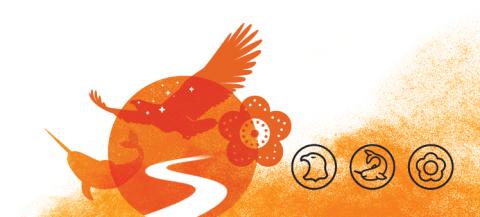
“The day honours the lost children and Survivors of residential schools, their families and communities,” it states on the web site. “Public commemoration of the tragic and painful history and ongoing impacts of residential schools is a vital component of the reconciliation process.”
Currently it is not paid holiday, but a day for non-Indigenous Canadians to reflect, listen and learn.
Heritage Canada provides a number of suggestions on how to spend the day to do your part towards achieving truth and reconciliation.
This 5-day, bilingual educational event will include programming designed for students in grades 5 through 12 along with their teachers and feature Indigenous Elders, youth and Survivors. The event will be pre-recorded and webcasted, allowing for schools and classrooms participation from across the country and the involvement of Indigenous and non-Indigenous students.
National Day for Truth and Reconciliation Broadcast
A 1-hour bilingual primetime show in partnership with, and broadcast on, CBC/Radio-Canada and APTN will be devoted to the National Day for Truth and Reconciliation. Programming will include presentations on the importance of this day as well as cultural and artistic performances in support of healing and giving voices to Indigenous peoples.
APTN will present pre-taped Sunrise ceremony featuring drummers, singers, Elders and various Indigenous traditions.
Orange shirt Day – 2021 events
List of public events held across Canada to commemorate Orange Shirt Day 2021.
Mental health supports available
Former residential school students can call 1-866-925-4419 for emotional crisis referral services and information on other health supports from the Government of Canada.
Indigenous peoples across Canada can also go to The Hope for Wellness Help Line 24 hours a day, 7 days a week for counselling and crisis intervention.
Call the toll-free Help Line at 1-855-242-3310 or connect to the online chat.
Truth and Reconciliation Commission and its calls to action
There were 140 federally run Indian Residential Schools which operated in Canada between 1831 and 1998. The last school closed only 23 years ago. Survivors advocated for recognition and reparations and demanded accountability for the lasting legacy of harms caused. These efforts culminated in:
- the Indian Residential Schools Settlement Agreement
- apologies by the government
- the establishment of the Truth and Reconciliation Commission
- the creation of the National Centre for Truth and Reconciliation
The Truth and Reconciliation Commission ran from 2008 to 2015 and provided those directly or indirectly affected by the legacy of the Indian Residential Schools policy with an opportunity to share their stories and experiences. The National Centre for Truth and Reconciliation has become the permanent archive for the statements, documents and other materials the Commission gathered, and its library and collections are the foundation for ongoing learning and research.
The Commission released its final report detailing 94 calls to action. The National Day for Truth and Reconciliation is a direct response to Call to Action 80, which called for a federal statutory day of commemoration.
The Government web site also provides a link to “explore the rich and diverse cultures, voices, experiences and stories of the First Nations, Inuit, and Métis peoples” here. And Heritage Canada site also offers “more to explore”:
Indigenous peoples and cultures
Learn about the unique history, languages, cultural practices, and spiritual beliefs of Indigenous peoples in Canada.
Learn more about Indigenous languages and the tools and programs in place to help support the reclamation, revitalization, maintaining and strengthening of Indigenous languages in Canada.
Funding - Culture, history and sport
Explore a range of funding opportunities related to culture, history and sport.
Learn more about the contributions of Indigenous peoples from the Royal Proclamation of 1763 through the world wars to today.
National Student Memorial Register
List of the children who died or went missing from their residential school. Search by name or school.
Residential school missing children - Community support funding
Funding to support families, Survivors and communities to locate and memorialize children of residential schools across Canada.